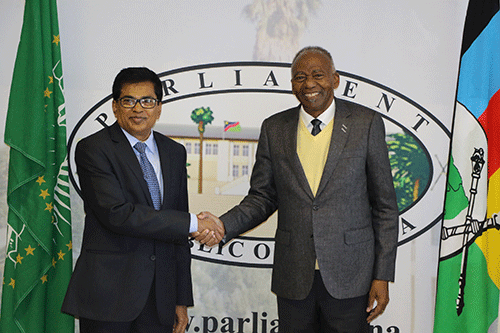George Sanzila
Speaker of the National Assembly Peter Katjavivi and newly-accredited High Commissioner of India to Namibia Subbarayudu Mandarapu have reiterated the need for the two countries to collaborate more, singling out renewable energy, information technology and innovation as areas with potential for future cooperation.
They believe the transfer of skills in these sectors could help the Namibian government tackle youth unemployment.
The discussion took place during a courtesy call by Mandarapu to Katjavivi.
According to Katjavivi, Namibia could draw lessons from India, who has made tremendous progress by linking institutions of higher learning to afford Namibian students a chance to further their studies and obtain practical training in various fields.
“We will continue to consolidate our good relations and find new opportunities for further cooperation. The protection of the environment and renewable energy are very important aspects. India has also advanced in terms of IT. We want to promote linkages between institutions of higher learning to encourage further studies and training among our young people,” he said.
The Speaker encouraged innovation and revealed plans to set up a working group he says would look at how to solve the pressing challenge of youth unemployment.
“The working group has to find solutions to youth unemployment and look at how this challenge is being tackled elsewhere in the world. We have to encourage innovation. Our institutions of higher learning should be able to train students to devise solutions. We have seen innovations, such as solar driven vehicles. These could be replicated, especially now that the world is faced with an energy crisis. This innovation could help our farmers and even become a SADC project,” stated Katjavivi.
He further revealed to the High Commissioner plans by Parliament to set up a parliament museum – a project he said has received support from Mandarapu’s predecessor.
According to Katjavivi, the planned museum that was briefly affected by the outbreak of Covid-19 will house artifacts and an interactive digital information system for the purpose of posterity. The idea emanated from the Speaker’s study visit to the Indian parliament in 2021.
Mandarapu praised Namibia’s democracy and progress made regarding gender equality. As part of future areas of cooperation, he proposed the need to increase the flow of trade between the two countries, including the transfer of skills he believes could be the panacea to the crippling challenge of youth unemployment.
“We have very good political and people-to-people relations; however, we need to move further and work towards increasing the flow of trade and the transfer of technology and skills to be able to empower Namibia to have the ability to produce. These efforts will help address some of the challenges, such as youth unemployment,” proposed the diplomat.
The meeting took place when the Indian investment and trade delegation was visiting the country to explore investment opportunities in a variety of sectors.
Although Namibia enjoys cordial political and diplomatic relations with India, dating back to Namibia’s liberation struggle, these relations have not translated into admirable trade and investment.
Namibia’s trade volume with India is negligible and stood at US$139 million during 2016-17, with the largest amount dominated by Indian exports at US$89.33 million.
Most Namibian imports and exports are traded indirectly through South Africa, and they are not reflected as Namibian or Indian products when re-exported, contributing further to lower trade volumes. However, there has been a steady increase in investments by Indian companies in Namibia, such as Vedanta resources and GPT Group of companies.
India also continues to help Namibia through a training programme for working professionals.
The Indian technical and economic cooperation programme has so far trained more than 700 Namibians in India in various fields, ranging from IT and Telecommunications, Rural development and energy. Many Indian expatriates also work and do business in Namibia.
*George Sanzila works for the National Assembly in the Division: Research, Information, Publications and Editorial Services



